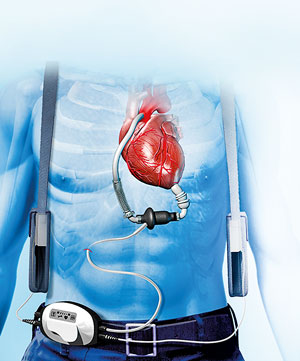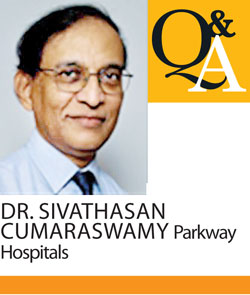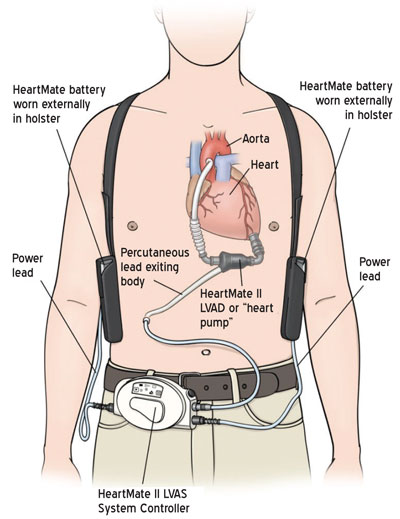Reply To:
Name - Reply Comment
Last Updated : 2024-04-19 21:46:00

Globally, the incidence of heart disease is increasing at an alarming pace. The stress of modern living, lack of exercise and diet patterns can be noted as contributory factors of this deadly prevalence. As we have heard countless times, heart disease can be prevented by taking precautionary measures. However, advanced heart failure requires urgent treatment and attention, which patients are rarely prepared for. Renowned Consultant Cardiovascular and Thoracic Surgery at the Heart, Lung and Vascular Centre of Mount Elizabeth Medical Centre, Singapore Dr. Sivathasan Cumaraswamy, has been awarded by the Ministry of Health, Singapore for his outstanding contributions to the development of cardiothoracic surgery. Born in Sri Lanka, Dr. Cumaraswamy is a proud graduate of the Colombo Medical Faculty and a Fellow of the Royal College of Surgeons of England. He is one of the few Sri Lankans to have literally held countless throbbing hearts in his own hands. In a recent interview with the Daily Mirror, Dr. Cumaraswamy demystifies what it means to be diagnosed with heart disease and advanced heart failure.

Q What does it mean to be diagnosed with heart disease?
If a person is diagnosed with heart disease, it can be treated through various means. We generally have three options. The first is through drugs and medication. Not all patients need opt for procedures such as Angioplasty surgery. The next group would be classified as those who require a balloon or stent procedure. Those with complicated multiple blockages in their arteries would have to undergo a bypass surgery. These are the standard basic procedures of cardiac surgery.
Whenever people suffer a heart attack, they lose part of their heart muscle. So, the effective mass of the functioning heart muscle gradually lessens if they keep getting heart attacks. It will come to a stage where the heart becomes weak and cannot supply blood to all the organs. It’s like a car engine which breaks down. Instead of running on four cylinders, it runs on two cylinders. The car will hardly move. This happens to humans when the heart becomes so damaged that they can’t generate enough blood to flow through organs such as the brain, kidney, liver and intestines. Patients who have had a massive heart attack and have collapsed can be resuscitated and revived. But some will end up with such massive damage that they will have difficulty managing day-to-day activities.
The second group of patients develop disease of the heart muscle. This is not due to the blockage of the arteries but due to the disease of the muscles. One such condition is cardiomyopathy, where the heart muscles are weakened and the heart grows larger and larger. Cardiomyopathy is commonly identified as a hereditary disease as it tends to pass from parents to children. This group is difficult to treat because the heart muscles alone cannot be treated. Another unusual group is those who develop viral infection of the heart muscles called Myocarditis. Other groups of diseases include heart valve disease. If treatment is delayed or if they are not treated properly, such patients will end up with advanced heart failure.
QWhat is advanced heart failure?
The early stages of heart failure can be treated with medicine. There are a number of ways this could be done. But as these stages progress and the heart becomes weaker, options become more limited. When the stage of advanced heart failure is reached, patients are very weak. They won’t be able to walk or leave the house. They will be breathless and their legs will start swelling due to congestion. They will have difficulty in breathing and eating because their liver and intestines will be congested as the heart is unable to pump out blood.
Doctors can look at such a situation in three ways. One is to opt for a transplant, which would be the best choice of treatment. In the past, there was no option other than preparing the patient to face their final moments with palliative care. But now we have the option to operate and hook on a mechanical or electrical heart pump. This gives patients another chance. This is done in an open heart surgery.
QWhat are the alternative options of treating advanced heart failure?
The left ventricle in the heart is the major pump. It ventricle receives oxygen-rich blood from the lungs and pumps it through the arteries to the rest of the body. In patients with heart disease, we connect the pump to the left ventricle, through a certain procedure. Blood will be pumped out from the left ventricle and will pass through a pipe connected to the aorta. In other words, this procedure partially bypasses the heart. The idea is to replace the amount of blood that is normally pumped by the heart with a machine which will pump the blood back to the body. This will restore the blood pressure, where the brain, kidney and intestines will receive an adequate supply of blood.
QWhich patients are eligible for heart transplant?
Nowadays, when we have a patient with advanced heart failure, we assess them and debate whether or not a transplant can be done. Generally the cut-off age to carry out a transplant in a patient is 65. Any person over the age of 65 is not an ideal candidate for a heart transplant. If a patient with advanced heart failure also has other organ dysfunctions such as those of the kidney, we cannot offer them a transplant because the immunosuppressive drugs used to prevent organ rejection will harm the kidney. Therefore, to have a transplant, a patient has to be relatively younger and fitter.

QAre there any other options other than heart transplant?
If the patient is not eligible, the other option we can offer is the Left Ventricular Assist Device (LVAD). We use this device on two groups of patients. One is for those eligible for transplant but where a donor heart is unavailable and the patient has to wait their turn on a waiting list. Obviously when they reach their turn, the chance of these patients surviving more than 18 months is only about 10%. In other words 90% patients will perish within 18 months. In such cases, we use the LVAD as a bridge to a transplant. We hook the patient up with the LVAD and get them back to an active life and put them on the waiting list. When a suitable heart becomes available, we call the patient and perform a heart transplant surgery.
For patients older than 65 and for those not eligible for transplant, we offer this device as a permanent form of treatment. In Singapore, we have given these devices to about 82 patients and our longest surviving patient has been living up to eight years now.
This particular patient got married after two years of receiving a LVAD following her diagnosis with cardiomyopathy. Following the procedure, such patients can return to their daily lives. The only hassle is carrying the electrically charged batteries around with them. The pump hooked onto the heart has a wire that exits the body from the abdomen. This wire is hooked on to the batteries that supply the electricity to the pump. These batteries are like mobile phone batteries and can last up to 18 hours. The patient has to wear these batteries hooked on to the system and carry two spare batteries with them. When the battery power is low, there are alarms that warn the patient. The quality of life of such patients is good. Nearly 80% of our patients are doing well.
QAre there any side-effects to these procedures?
Problems can arise. Infections can be caused as there is a foreign body entering a patient. This is one of the side-effects which is also a major problem. Patients need to maintain their hygiene and clean the exit site with antiseptics every day and keep it dry. Neglecting this may cause serious infections. Once the patient is stable within a few months, they can do this on their own without a caregiver. Secondly, because these pumps are made of titanium, when blood comes into contact with the pump, it tends to clot. To prevent this, we give the patients anti-clotting agents to keep the blood thin. We use a combination of Aspirin and Warfarin. Warfarin is a common drug used on patients prone to blood clots. These patients have to be on this drug for a while. In rare cases, some patients even bleed into the brain. There is only a 5-10% chance of this happening.
QHow accessible are these forms of treatment?
The pump alone costs approximately US$100,000. The accessories such as batteries have to be taken into consideration as well. By the time patients with advanced heart failure come to us, they are very sick. Most Asian patients are very reluctant to have these procedures done and avoid surgery at all costs leading to their health deteriorating as they wait. In the West, patients get surgeries done early and their recovery is smooth and effective. In our experience, on average, patients must remain in intensive care for at least one week. Their hospital stay would be around three to four weeks. As a result, hospitalisation costs are also high and can easily come up to around US$150,000, depending on how sick they are.
QHow prevalent is heart disease in Asia?
Heart disease is becoming a major non-communicable disease. About 10% of our patients with chronic heart disease ultimately reach the stage of advanced heart failure. On a global scale, about 8% of the world’s population live in the United States. However, of all transplants done globally, 60% are reported from the US. Whereas, if you take Asia with the largest population in the world, the number of transplants done annually is only about 5%. Europe, with only about 12% of the world’s population, carry out 30% transplants.
QHow far is Sri Lanka from implementing a heart transplant programme?
There are patients who are gravely ill and waiting for a heart transplant. Hospitals are trying their best and as it is, kidney transplants and liver transplants are being done in Colombo. The waiting list is a normal routine when it comes to heart surgery. Unfortunately, a majority of these patients will not live for more than 12 to 18 months. I understand that there are initiatives to implement a heart transplant programme here. I have been coming to Sri Lanka in the last couple of years. We have worked on protocols of managing heart patients. There are capable surgeons and cardiologists in the country. First of all, the heart transplant programme can be implemented in Sri Lanka as the cost is much lower than the LVAD procedure. Only a handful of countries can afford the LVAD procedure. In Singapore, we can afford it because the population is relatively small consisting of only 5 million people. In Sri Lanka, there is a population of 22 million. Generally the people of Singapore are also healthier and the patients are therefore less.
Your feedback is very important to us. We can help you resolve your health concerns and problems. Tell us how we can improve with ideas, suggestions and comments. Your queries on the stories we have found for you are also welcome. Write to us at
dmhealthcapsule@gmail.com. Let us help you achieve your health and fitness goals with
‘Health Capsule.’

Add comment
Comments will be edited (grammar, spelling and slang) and authorized at the discretion of Daily Mirror online. The website also has the right not to publish selected comments.
Reply To:
Name - Reply Comment
On March 26, a couple arriving from Thailand was arrested with 88 live animal
According to villagers from Naula-Moragolla out of 105 families 80 can afford
Is the situation in Sri Lanka so grim that locals harbour hope that they coul
A recent post on social media revealed that three purple-faced langurs near t